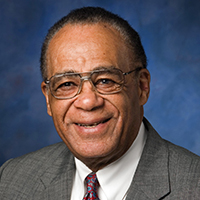An Opinion from Dr. John Brooks Slaughter, USC Dean’s Professor of Education and Engineering
Dr. Slaughter has served as the USC Dean’s Professor of Education and Engineering since 2010, and recently announced his retirement, effective June 2022. Professor Slaughter’s storied career spans 66 years and includes working in the private sector, academia and federal government.
STEM education. The very mention evokes visions of young people learning coding or the latest tech software, engineering rocket ships to send to Mars or performing high-level math that will be used to build a better cell phone. All of these are admittedly, good things. However, I argue that much of current STEM education has failed to meet the most important needs of students as well as the rest of mankind by ignoring a key question – how do we teach our students that technology cannot exist in a vacuum without questioning how it affects or benefits humanity?
While it is understandable that nations wish to develop work forces capable of ensuring a competitive position in the global race for leadership in the creation and production of technological artifacts, I believe that students should be educated for the greater purpose of a fulfilling and beneficial life, not just for making a living. I believe that the STEM education needed is one that prepares today’s students to become involved and aware adults with a dedication to societal good in a world that is becoming increasingly complex, pluralistic and interdependent.
It is my contention that a mere emphasis on teaching the subjects of STEM is insufficient if we are to provide students with the necessary sensitivity, compassion, and capacity to address and resolve many of the crucial current and impending issues facing the world. What we should be adding to STEM education is a foundation in humanities.
In the Technology and Society course I teach for first-year students at the University of Southern California, I have found that today’s youth are the most intelligent, informed and committed to improving the world than any generation of young people before them. They, and generations that follow, will be the ones who will be called upon to address and find solutions to the difficult problems and challenges of a global society that is becoming increasingly dependent upon technology in every facet of our lives. Most of them have become familiar with a few aspects of technology in their young lives. But technology, as many of them have yet to learn, is much more than computers, cell phones and information processing equipment – it’s also about how we, as humans, can develop and apply science and technology to become better, more compassionate people.
Recently, I read an article in The Guardian US about this year’s Super Bowl held at SoFi stadium. The article described the dichotomy between the wealthy attendees of the game and the homeless tent occupants and far less privileged Los Angeles area residents who they passed on their way to the stadium. SoFi stadium is a unique and visionary architectural achievement, conceived and constructed by employing some of the most advanced design and technological concepts ever seen in a football stadium, and it stands out in contrast to many of the local homes and businesses.
At the end of the article, The Guardian asked readers to donate to the paper, and the opening few phrases of the addendum, as well as the disparity highlighted in the article between the local human suffering and the new technology at the stadium — propelled me to write this piece.
The addendum read: “An erosion of democratic norms. An escalating climate emergency. Corrosive racial inequality. A crackdown on the right to vote. Rampant pay inequality. America is in the fight of its life.”
These six phrases confirmed what I have believed for a long time – that while it is true that we will need well-prepared technologists in the future, including more from minoritized groups, women, economically disadvantaged and rural populations — what we really need are technologists who are also humanists.
Although not all STEM students will choose to become engineers or scientists, those who do will have a special responsibility to think about the potential uses and users of their creations as well as those who may be disadvantaged by their very existence. No longer should an engineer design a freeway or bridge that will destroy a neighborhood whose residents lack the financial, social, or political capital to prevent its construction, without thinking about its consequences. No longer should an architect design a building that does not have adequate access for those who may be disabled in some way. No longer should a computer scientist develop a digital photographic software app that enhances the features of a person with white skin and leaves those with dark skins in the dark, literally and figuratively (no pun intended).
Thus, a STEM education should be much more than the study of the principles and applications of science, technology, engineering and mathematics. A STEM education should require an appreciation of and an engagement with the liberal arts, humanities and the social sciences in order to be truly meaningful. A STEM education that is bereft of these components is deficient and the recipients, to paraphrase Dr. Benjamin Spock, will emerge “literal-minded, uninformed about the world, and insensitive.” One of the most satisfying aspects of teaching my students about the inextricable relationships between technologies and humans is to see them begin to understand the myriad, complex connections that can exist between science and technology and being compassionate humans.
As Dr. Eswaran Subrahmanian, a Research Professor of Engineering and Public Policy at Carnegie Mellon University has described, a STEM education should be “…. a field of study that embraces disciplinary diversity, drawing from science, engineering and technology, social science, and art. An arena of practice where people are the focus, where different perspectives can come together and shape the world.” I call on those of us who are educators to create such a STEM educational environment for our students.







